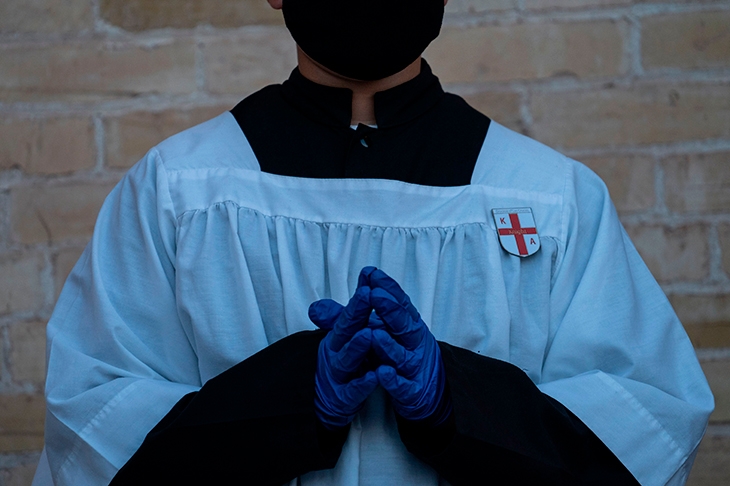Of all the sad and surreal things to happen in the past few months, the Catholic church’s decision to abandon the dying was, for me, the worst. The Church of England abandoned its churches, forbidding first congregants then priests from setting foot in them, making it clear that in fact it actively dislikes church buildings. But the Catholic church in England betrayed the people who needed it most: the men and women who found themselves in the awful eye of the storm, dying of Covid-19 without family and, as it turned out, without even the possibility of a priest.
As our infection rate begins to rise again, and with talk of a second wave in Europe, it’s worth looking at that sequence of events in April, and at the mind-boggling response of the English Catholic bishops, so that perhaps they might think better next time — or at least not play us so much for fools.
On 5 April, the Catholic Bishops’ Conference of England and Wales issued a statement entitled ‘Revised Hospital Chaplaincy Advice’, which after a paragraph of prevarication produced one clear sentence: ‘Priests and chaplains must follow the visiting instructions from hospital and trust authorities.’ Given that the visiting instructions in hospitals were not to visit at all, this, for the most part, put paid to anointing of the sick (or extreme unction), the sacrament that we’re told has the effect of uniting the sick person with Christ, giving them the strength, peace and courage to endure suffering, forgiving their sins and preparing them for eternal life. Priests can offer telephone support instead, said the bishops. Always good to chat when you’re on a ventilator.

One of the many depressing things about the decision was that it was unnecessary. Priests were already anointing patients safely, wrapped in PPE, using a cotton bud dipped in holy oil. This is the way it’s being done all around the world. So why is the English church so uniquely risk-adverse? I imagine they made the decision by committee, in a Zoom meeting, where no one need ever catch another’s eye. I imagine, after decades of promoting the sorts of people who take their commitment to health and safety very seriously, it’s not the thing to point out when they’ve gone too far. The bishops were afraid, of course they were. At that point in April, 90 priests had died of the virus in Italy. But we were all afraid, and if there was ever a time we needed the church, this was it.
‘The word cowardly comes to mind,’ wrote Damian Thompson on Twitter in response to the statement. Other words come to mind too. Like: catastrophically self-defeating. You’re perfectly entitled to think that the idea of magic oil is daft, but the bishops are supposed to believe in it. They’ve told their flock to order their lives around the sacraments; they wouldn’t be bishops without them. When they abandon the sacraments, they destroy their own credibility.
If it’s too much hassle for a chaplain to put on a protective suit, if it’s not really worth the risk, just to anoint someone with oil, then why, when you think about it, bother with baptism? What’s so special about holy water? If blessing down the phone works just as well for the dying, why lay on hands during ordination either? Come to think of it, why do we need the physical presence of a priest at all?
After the own goals came the unattractive buck-passing. On the face of it, Catholic bishops in England were just as keen as the rest of the country to praise the NHS. Cardinal Vincent Nichols, Archbishop of West-minster, began a series of Thursday masses in its honour, starting at 7 p.m. and ‘ending in time for the clap for our carers’. Health workers, said the Cardinal in a Thursday homily, follow a tradition which ‘bears the hallmark of the Christian faith… its commitment to caring for all, especially the poorest, sprang from the determination to follow the teachings of Christ’. By the Cardinal’s own definition, our medics have been better Christians than our bishops. Yet just as they blamed the government for the decision to shut churches, so, almost imperceptibly, bishops laid the blame for deserting the dying on the NHS.
Priests were told to offer telephone support instead – always good to chat when you’re on a ventilator
The whole tone of that 5 April statement suggested that hospitals had been lobbying the church to suspend visits from chaplains. Its author, Bishop Paul Mason, explained that giving access to chaplains is tricky; doctors don’t want priests to become ‘links in the chain of infection’ and it wouldn’t be right for priests to use masks meant for medics.
Has any single NHS hospital ever contacted the Catholic church to complain about the presence of chaplains? I’d love to know. I’m also keen to find out, given how concerned the church is about scarcity of PPE for medics, what provision they’ve made since April. I wrote to the bishops last week asking if I might see their plans for the winter. I assume they’ve been stockpiling priestly PPE and testing young, fit clergy for antibodies, assembling a crack team of corona chaplains. No answer yet.
More depressing even than the 5 April statement, if you can bear it, was a report in the Catholic Herald on 9 April, which mentioned that though the Vatican had itself suggested the introduction of ‘extraordinary hospital chaplains’, the bishops here still felt that it would be unwise. Clergy ‘with long experience of the NHS, all of whom asked not to be named’ explained to the reporter that this whole business of preparing distraught souls to meet their maker was all just too tricky at the moment. Think of the things a priest needs, they said. Think not just of the oil, but of the prayer books. Because of the rules about moving potentially infected items between rooms, any special hospital chaplains would have to either commit the words in the prayer book to memory, or write them on a piece of paper that he then left behind in the room. See? Littering. Who could countenance such a thing?







Comments